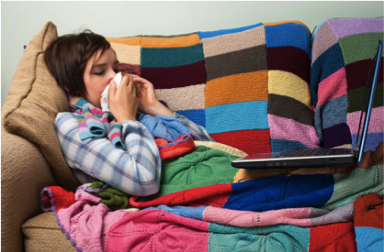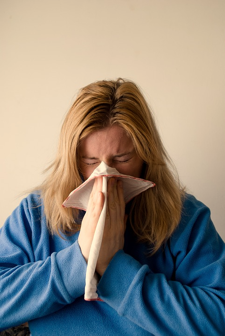[x_author title=”About the Author”]
As the days grow shorter and the air crisper, we wrap up warm and prepare for the winter to come. But, as every year, the threat of the dreaded flu hangs over us. Keep reading to find out how you can protect your loved ones from being bed-ridden in the coming months!
Flu or not flu?
It starts with a headache, and a tickling in the throat. Then your nose is congested and you start to feel cold. Before you know it, you’re stuck in bed unable to move and find yourself relying on others for things as simple as getting a glass of water. You’ve got the flu!
 A common misconception however is to confuse a cold with the flu. They are caused by different viruses, and are actually quite different illnesses. For example, cold symptoms are mild and gradual, and only affect the upper respiratory tract (mouth, nose and throat). A common test amongst doctors is the ‘Ten Pound Note Test”. Picture a £10 note on the floor. If you reach down and grab it, you are more likely suffering from a cold than the flu!
A common misconception however is to confuse a cold with the flu. They are caused by different viruses, and are actually quite different illnesses. For example, cold symptoms are mild and gradual, and only affect the upper respiratory tract (mouth, nose and throat). A common test amongst doctors is the ‘Ten Pound Note Test”. Picture a £10 note on the floor. If you reach down and grab it, you are more likely suffering from a cold than the flu!
The importance of this distinction is that flu is a different illness all-together and can sometimes result in complications such as pneumonia or bronchitis, which could lead to hospitalisation.
To avoid contracting the flu and/or passing it on to your loved-ones, immunization seems to be the only viable option nowadays, really. So how can you get immunized?
How do vaccines work?
Infection is the crossing of our physical and/or chemical barriers – skin and mucus – by a bacteria or virus. In the case of the flu, infection is the entering of the flu virus into the body, and contracting the flu is what happens when you become ill as a consequence of catching this flu virus. Once the body has fought off the infection, it retains a chemical in the blood which can neutralise the foreign entity if (or when) it re-enters the body. The creation of this chemical is called immunization, and happens naturally when we get infected.
Vaccination is the stimulation of this mechanism, without falling ill, by insertion of a degraded or dead micro-organism (pseudo-infection).
Do vaccinations really work?
The reason this type of flu is called “seasonal flu’ is that it is, precisely, seasonal. This virus mutates very fast and every year it is slightly different to last year’s. However, vaccines have to be designed well in advance to flu season, which means virologists have to predict what the new virus will be. This is not an error-free science, and they do sometimes get it slightly wrong, which implies the vaccine may not be as effective as hoped. It however will maintain a certain level of efficacy.
A RAND survey found that 28% of Americans don’t get the flu vaccine because they estimate they don’t need it. You SHOULD get the vaccine if:
- You are vulnerable. Your doctor will tell you if you are vulnerable, but as a general rule, if you are over 65, have a chronic condition or a child, you must get the vaccine.
- You live with vulnerable people. Not falling ill with the flu involves in it’s many advantages protecting to those closest to you. If you live with someone with a chronic health problem, or who is over 65/under 6-months, you and all the members of the household MUST get vaccinated so as to protect them.
- You are pregnant. It is vital you get vaccinated (at any stage from conception onwards) to make sure you don’t fall ill, which can be very dangerous for the unborn child. It also offers protection from that virus for the first few months of the baby’s life. If you think you might have contracted the flu, contact your doctor urgently.
Could the vaccine be dangerous?
 There has been mounting controversy as to the safety of the flu vaccine. The main reason for this is that the flu vaccine contains more than one dose (multi-dose vials) and to prevent contamination, has an ethylmercury-based preservative – Thimerosal (interestingly, the nasal-spray does not). Ethylmercury can be toxic, but is evacuated by the body faster than methylmercury, which is found in some fish like sardines. US governmental guidelines indicate however that it is safe in vaccines.
There has been mounting controversy as to the safety of the flu vaccine. The main reason for this is that the flu vaccine contains more than one dose (multi-dose vials) and to prevent contamination, has an ethylmercury-based preservative – Thimerosal (interestingly, the nasal-spray does not). Ethylmercury can be toxic, but is evacuated by the body faster than methylmercury, which is found in some fish like sardines. US governmental guidelines indicate however that it is safe in vaccines.
In 1976, there were a handful of cases of Guillan-Barré neuritis (an autoimmune disease) following the influenza vaccination, but since then there has been no more evidence of a link between the influenza vaccine and autoimmune diseases.
It’s also worth noting that you will not catch the flu by having the vaccine, as it does not contain active viruses – if you get ill it is most likely a flu-like illness, or that you caught the flu before your immunization.
Should my children get vaccinated?
Vaccinating your children is recommended by health officials, and this is for a number of reasons. Firstly, it can help prevent them from contracting the flu (helpful for working mums who won’t have to take time off work!). It also helps prevent the spread of the infection in schools and nurseries, which are usually where illness spreads the fastest. Finally, it helps build up your child’s immunisation history. This vaccine is available free of charge for some children as part of an immunisation campaign run by the NHS in collaboration with some schools.
Check out if your child is eligible here.
My children are scared of needles…
Finally, a solution for the trypanophobics amongst us! New for this season is the vaccine in the nasal spray form, which in fact is more effective than the jab, research hints. Easy to administer and 100% needle-free, this innovation is already proving popular. Consult your GP for more information on getting the nasal spray vaccine.
I already had a flu vaccine last year, why should I get it again?
As mentioned, flu virus evolves the more we fight it. So every year, the virus going around is slightly different genetically to the previous years. This means every year researchers have to come up with a new vaccine which is specific to this new virus.
Additionally, even if you contract this year’s flu, you should still have the vaccine as it will offer additional protection against other strains of flu.
For any concerns or uncertainties, contact your GP.
[x_share title=”Share this Post” facebook=”true” twitter=”true” google_plus=”true” linkedin=”true”]
Sources:
Michael B. Rothberg (2007) Complications of Viral Influenza. Retrieved from : http://www.amjmed.com/article/S0002-9343(08)00072-7/fulltext
Harris – Seasonal Flu Vaccination: Why Don’t More Americans Get It? Retrieved from: http://www.rand.org/pubs/research_briefs/RB9572.html
NHS 2015, Flu and the Flu vaccine. Retrieved from : http://www.nhs.uk/Livewell/winterhealth/Pages/Fluandthefluvaccine.aspx
CDC 2013, Thimerosal in Vaccines. Retrieved from : http://www.cdc.gov/vaccinesafety/concerns/thimerosal/index.html
CDC 2015 Guillain-Barré syndrome and Flu Vaccine CDC. Retrieved from: http://www.cdc.gov/flu/protect/vaccine/guillainbarre.htm
NHS 2015, Which children can have the flu vaccine? Retrieved from : http://www.nhs.uk/conditions/vaccinations/pages/which-children-are-eligible-for-the-flu-vaccine.aspx
